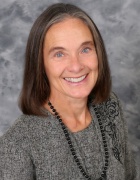Annette L. Bunge
Colorado School of Mines
Professor Emeritus
Wednesday, May 1, 2019
Using Electrochemical Impedance Spectroscopy to Study Human Skin
Impedance spectroscopy is a transient electrochemical technique in which an oscillating potential is imposed on a system and the resulting current is measured. The ratio of the input over the output is called the impedance. The frequency of oscillation may be varied, and the resulting impedance will change according to the imposed frequency. In the skin literature, single-frequency impedance measurements are often used, but our work shows that important additional information can be gathered using a full spectrum of frequencies. This is illustrated by two studies: (1) dimethyl sulfoxide (DMSO) damaged skin, and (2) lab-to-lab variation in the electrical resistance identification of poor quality skin samples. The impedance responses after exposure to neat DMSO as a function of time show that irreversible damage occurred along a moving front rather than through channel creation and expansion. Impedance measurements of mechanically damaged skin were used to prove that DMSO did not open discrete pathways in the skin by showing that the impedance of DMSO had features that were not observed in the impedance of punctured skin. By combining our extensive impedance-frequency data with measurements of water permeability and electrical resistance from several labs, we were able to develop a standardized method for consistently identifying skin that should not be used in dermal absorption experiments.
Bio-Sketch
Annette Bunge is Professor Emeritus of Chemical and Biological Engineering at the Colorado School of Mines, which she joined in 1981 as an Assistant Professor. She was awarded tenure and promoted to Associate Professor in 1985, promoted to Professor in 1991, and awarded the title Professor Emeritus in 2005. Since then she has continued to work on research and as a mentor to graduate students, postdoctoral fellows and faculty. Dr. Bunge began her chemical engineering studies at the University of Oklahoma, but transferred after three years to the State University of New York (SUNY) at Buffalo, where she completed her senior year, graduating summa cum laude with a B.S. in Chemical Engineering. She then completed a Ph.D. in Chemical Engineering at the University of California, Berkeley. Her academic career has been characterized by transitions and firsts (or near firsts). She was the only woman in all of her undergraduate chemical engineering classes. She was the third woman to receive a Ph.D. in Chemical Engineering at Berkeley. At Mines she was the first woman professor in the Chemical Engineering Department, and the first woman to be promoted to the rank of Professor. In research Dr. Bunge adapted to changing scientific needs by moving from her doctoral work on enhanced oil recovery to her focus for more than 30 years: absorption of chemicals into human skin. The goal of this research is to understand how skin behaves as a barrier to chemicals contained in liquids, particulate materials, and solid residues that contact the skin as medicines or during environmental or occupational exposures. This is a multidisciplinary effort and Dr. Bunge has long-standing collaborations with scientists and engineers at Mines and around the world, including pharmaceutical chemists, dermatologists, toxicologists, statisticians, mathematicians and computer scientists. She has provided expert opinion on dermal absorption and risk assessment to government agencies in the United States, Europe and Canada. In the United States, the risk assessment process required by the Environmental Protection Agency at Superfund sites includes calculations based on her research. In Europe, it was recently recommended that evaluations of new generic medicines that are applied to the skin could be compared with existing approved products using a skin sampling method developed in her laboratory. Dr. Bunge has been the Principal Investigator or a significant contributor on research projects totaling more than $10 million. She has published more than 90 refereed papers, 24 book chapters and 170 conference proceedings, and she has given invited lectures at international conferences in Europe, Australia and South America.
